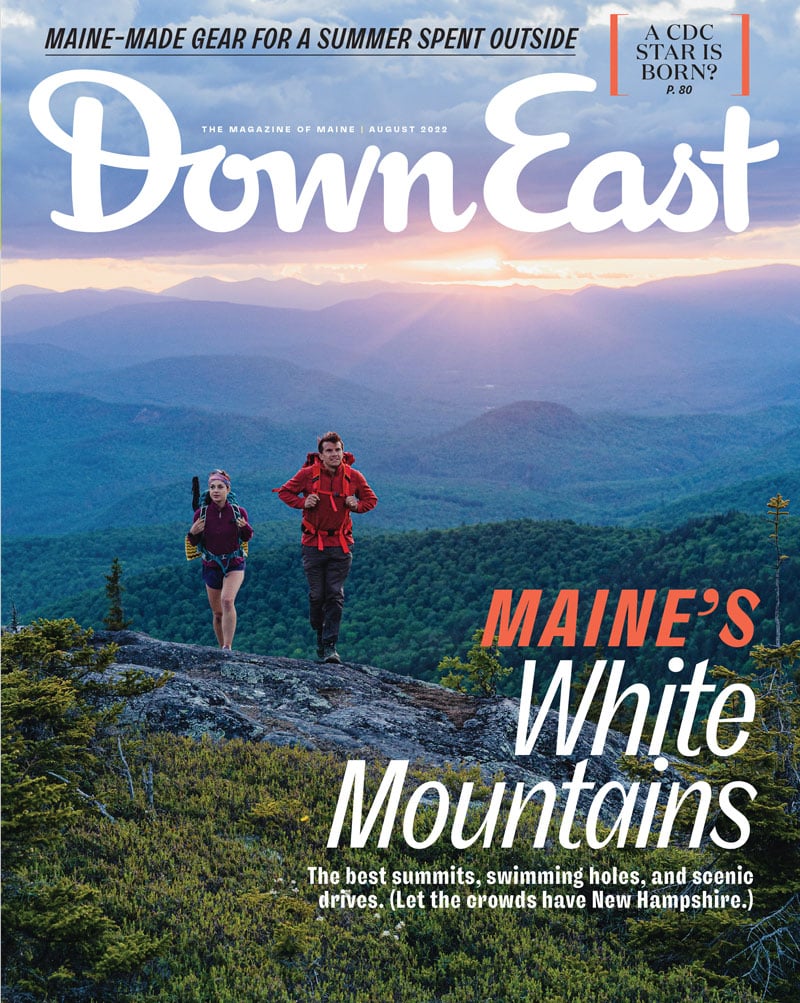By Jesse Ellison
Photographed by Tristan Spinski
From our August 2022 issue
One of the strangest parts about being famous in the particular way that Nirav Shah is famous is that strangers often approach him and burst into tears. That and the Diet Cokes, cans of which get tied in red ribbons and left on his porch, shipped in bulk to his office, and handed to him in person by people who, upon noticing him, rush to the closest store, so that when they introduce themselves, they can present him one, like an offering.
Shah, who is 45, has been an economist, an attorney, and an advisor to the Cambodian government. But across Maine, he is recognized — at the farmers’ market, at restaurants, during the hikes he takes with his wife, Kara Palamountain — as the face of the pandemic response in a state that, at the start of the outbreak, ranked among the nation’s most vulnerable. During the nervous early-pandemic months of 2020, Shah — then brand new as director of the Maine Center for Disease Control & Prevention — rocketed from anonymity to ubiquity. He seemed to saturate Maine media, giving daily televised briefings, answering questions on radio call-in shows, and posting a stream of updates to Twitter — along with endearing dad jokes, photos of his dog, and, long, occasionally irreverent threads. In a state known for a certain reticence towards newcomers “from away,” Shah, who’d never stepped foot in Maine until three years ago, has found himself the darling of a 40,000-member Facebook fan group, the inspiration for a chocolate bar bearing his likeness, and the subject of a slogan “In Shah We Trust,” emblazoned on shirts and coffee mugs and at least one flashing municipal highway sign.
This spring, the health-care think tank Commonwealth Fund ranked Maine first in the contiguous U.S. for the state’s management of the COVID pandemic (Hawaii scored higher). Shah, meanwhile, received four separate honorary degrees and gave commencement speeches at three universities. In June, the Maine Hospital Association named him its Caregiver of the Year. Mike Fraser, executive director of the Association of State and Territorial Health Officials, whose membership comprises public-health directors from all across the country, says he’s hard-pressed to name one who’s garnered as much public affection. Maybe Amy Acton, he says, the former head of Ohio’s Department of Health, who enjoyed a period of folk-hero status — but then resigned after receiving anti-Semitic abuse and death threats.
“Nirav’s been very steady in a way that other health officials haven’t been able to be because they had to pull back for their own safety,” Fraser says. Shah is also the association’s current board president and, as Fraser points out, a “leader among peers,” consulting with other state officials at least once each week. “He’s been an icon for Maine,” Fraser says, “but also for the whole country.”
Shah arrived in Maine in the spring of 2019 after what had been, for him, an exceptionally bad year. He’d just been replaced as director of the Illinois Department of Public Health, a position he’d once called a “dream job,” to which he’d been appointed by a Republican governor in 2015, at just 37 years old. Early in his tenure, an outbreak of the respiratory infection Legionnaires’ disease at a western Illinois veteran’s home made headlines, eventually contributing to 12 deaths. In the state’s 2018 governor’s race, Shah’s office’s handling of the crisis became a campaign issue, and Democratic Illinois senators Dick Durban and Tammy Duckworth both publicly called on him to resign. In November, the governor who’d appointed him lost in a landslide.
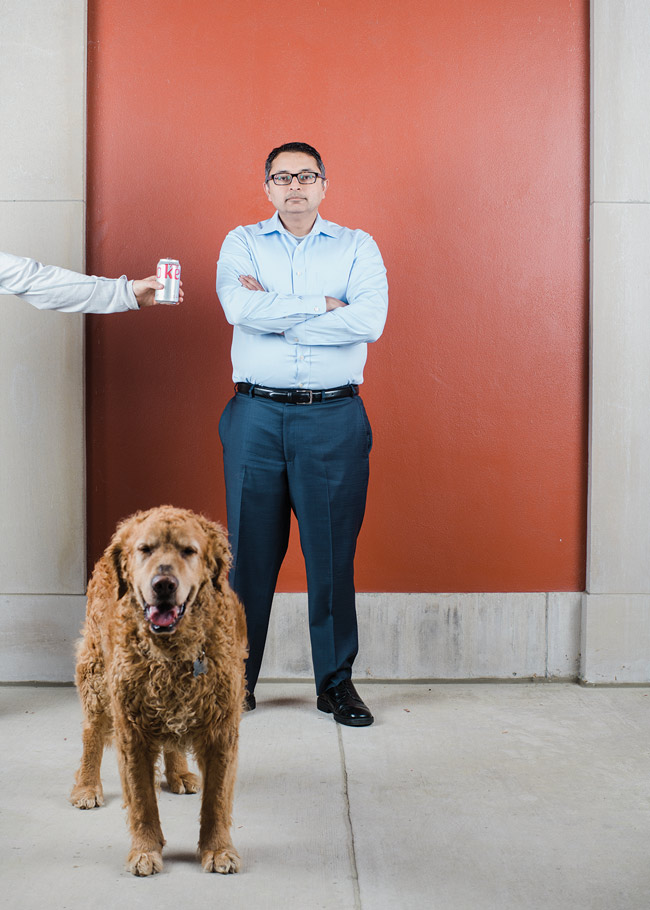

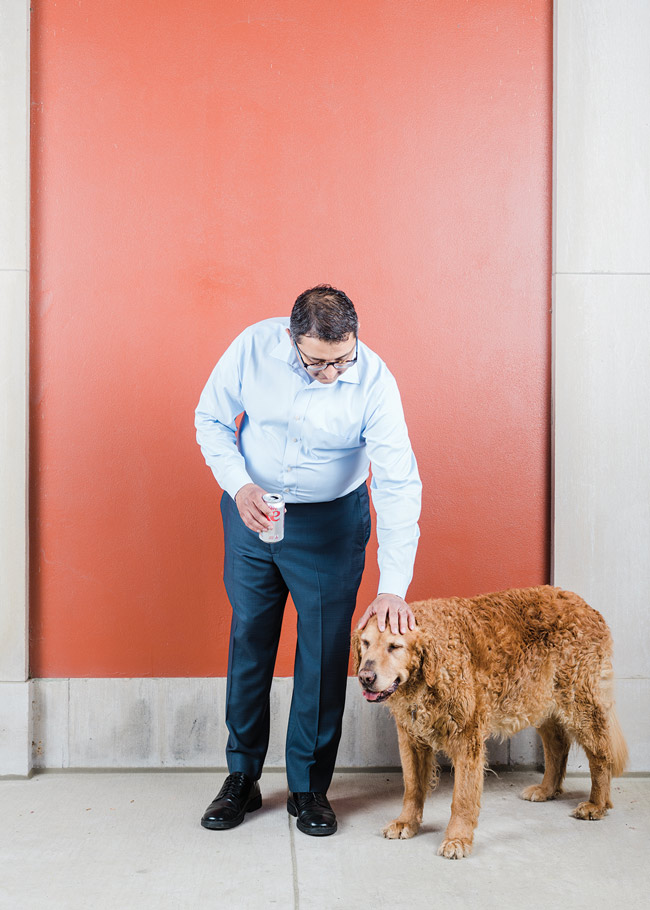

Meanwhile, Shah’s father, Dinesh, was losing a prolonged battle with lung disease. Dinesh had grown up in a tiny village in India, the child of mango and coconut harvesters, in a hut with a dirt floor and an open fire. He was 16 before he owned a pair of shoes. He excelled in school, though, and went to college and then medical school, coming to the U.S. in the ’70s for his residency. At the time, the quickest path to a green card was to work in an underserved area, so he and his wife, Shaila, moved to Medford, Wisconsin, population 5,000, and opened a small practice. Nirav, their only child, was born in 1977 and eventually earned not only a medical degree but a law degree as well. Before being tapped to run Illinois’s state health apparatus, he was billing $700 an hour at the same white-shoe law firm where the Obamas met.
Dinesh passed away the same week that Shah was supposed to start as director of Maine’s CDC. When Democratic governor Janet Mills appointed him, in May of 2019, the agency was rebuilding, left significantly understaffed during the previous administration of Republican governor Paul LePage. During eight years in office, LePage made no secret of his contempt for the massive Department of Health and Human Services, which oversees not just the CDC but everything from nursing homes and daycare facilities to drug-dependency campaigns and food-safety guidelines. When LePage left office at the start of 2019, more than 100 vacant CDC positions had been left unfilled; the workforce was three-quarters of its size from 2011.
Shah was, nonetheless, thrilled about the job. Rarely does any governor appoint someone from out of state to head important agencies. After Illinois, Shah thought he’d never have another opportunity to run a health department, and every other job, he told me recently, sounded boring. He’d never been to Maine before his interview with Mills, but something about the place felt instantly familiar. He’d been in Chicago for nearly two decades, but Maine reminded him of where he’d grown up, in northern Wisconsin. It reminded him of a place that he missed. The week after Dinesh died, Nirav and his mom got in his wife’s Ford Focus and headed east.
The first person Shah met was Peggie Lawrence, his scheduler and secretary, who retired this summer after 40 years in state government. They met in the lobby of the downtown Augusta building that houses the CDC. Lawrence remembers discovering they had the same family structure: married, no kids. Shah remembers talking about their shared interest in cooking, a mild obsession of his. What struck Lawrence at the time was how present her boss seemed. “A lot of times, when you meet an executive in the lobby, they’re focused on getting upstairs and what they’re going to say,” she says. “But he was in the experience. I was struck by the way he looked me directly in the eye and asked me about myself.”
She laughs to recall the weeks that followed: two hepatitis outbreaks in Shah’s first week on the job, a sudden influx of asylum seekers arriving in Portland, a transformer exploding outside their offices, forcing everyone to evacuate. Then, a flood from a malfunctioning HVAC system that destroyed their entire floor. During his first year on the job, Lawrence teased Shah that he had brought the chaos with him from the Midwest.
An anecdote Shah tells these days that always gets a laugh: In February 2020, while he was addressing a committee at the State House, a legislator asked what was keeping him up at night. He was concerned, Shah said, about a situation unfolding with a new virus in China. When he got back to his office, a staffer popped his head in and asked what was happening in China, as if Shah had been referring to the central Maine farm town.
By then, Shah had already stepped up the state’s supply of personal protective equipment. He was likely one of the country’s first health officials to start taking action, placing an order for PPE on the first day his offices were open after the New Year holiday. Shah was uniquely attuned to health information coming out of Asia because of time he spent in Cambodia during medical school, when (“out of boredom,” he says) he applied for and received a fellowship to study there. He spent two years in Phnom Penh, serving as an economist for the Cambodian health ministry and emerging with a newfound passion for health policy and a deep well of contacts. Those channels helped keep him informed of the severity of Asia’s COVID-19 outbreak. Among the things he’s most proud of today is that Maine’s doctors and nurses faced no shortages of medical gowns or N-95 masks — never resorting, as in other states, to wearing garbage bags.
Shah took to the airwaves as soon as the coronavirus arrived in Maine. For months, his briefings were daily, broadcast by TV stations and public radio, livestreamed by the major newspapers and others. Turn on your preferred device and there was Shah’s bespectacled face, framed by a bookshelf and a small landscape painting, peering into his laptop’s camera. He would start with statistics — new cases, hospitalizations, deaths; later on, vaccination rates — then field questions from reporters, often pausing for big swigs from the can of Diet Coke that became his trademark. He acknowledged every question as a good one and seemed firmly in command of the facts. If he didn’t know something, he’d say so and promise to follow up. He never seemed to equivocate or pander. He typically signed off with the same reminder: “Please be kind and take care of one another.”
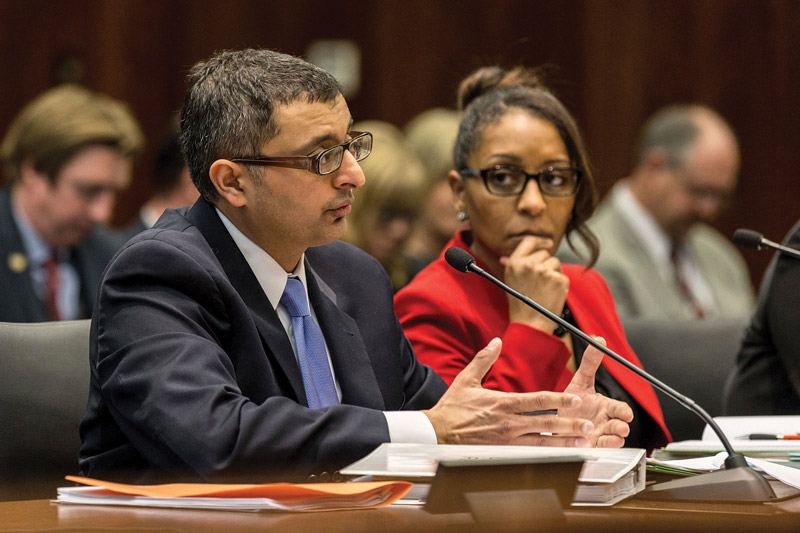
Mainers were won over not only by Shah’s evident knack for data and commitment to fact gathering but also by his approachability and a dry, zany streak. As the months of briefings went on, he occasionally deadpanned groaner lobster puns and pop-song lyrics into his remarks (“Maine’s CDC contact tracers,” he explained, straight-faced, in September 2020, “are never going to give you up, never going to let you down”). Followers of his Twitter feed, meanwhile, found him equal parts wonkish and droll. One day, he’d post a 13-tweet thread, complete with charts, unpacking complex vaccine-trial data to help contextualize the unlikelihood of a specific side effect. The next day, he’d quip that his booster shot helped him nail the pie-crust recipe he’d been working on, then geek out about baking minutiae with strangers in his replies (“Vodka in pie dough has been a game-changer for me,” he tweeted).
Robert Long is the Maine CDC’s communications director, a job he took after stepping down as politics editor at the Bangor Daily News (seeking a healthier work-life balance — a “most epic fail,” he jokes). As the state launched its pandemic response, Long, Lawrence, and Shah became a pod, working 80-hour weeks, subsisting on pretzels and hummus, seeing more of each other than any of their spouses.
“Peggie and I joke that his brain has multiple chambers, like a nautilus,” Long says. “He’s just functioning on levels that we don’t even conceive.” As evidence of Shah’s “vibrant mind,” Long mentions Quincy, his boss’s 13-year-old rescue dog. “He’s really intrigued by Quincy’s worldview,” Long says. “He’s genuinely interested in how other humans and his beloved canine see the world. In the elevator, he’s like, ‘What do you think Quincy is thinking? We go into a room where the doors close, and then they open and we’re somewhere else. Is it magic? Can dogs conceive of magic?’”
The cards and letters started arriving about a month in. First a trickle, then a flood. Lawrence calls it “an amazing phenomenon.” People sent drawings their children made, cards, letters of gratitude. They shared stories of the loved ones they’d lost to COVID, nonetheless praising Shah for his leadership. Before long, dozens were arriving every day. “Twenty, thirty, forty, fifty, sixty,” Lawrence says. “I can’t even read all of them, and it’s my job to open the mail.” People sent in gifts: Diet Coke, of course, but also homemade cookies and handmade face coverings. Someone sent dozens of whoopie pies.
At some point, Lawrence discovered the fan page on Facebook. “He was so shocked,” she remembers. “I mean, what health department director has a fan page?” Three months into the pandemic, Wilbur’s of Maine, a long-established chocolatier, asked permission to put his face on a confection. “The ‘Shah Bar’ is just as sweet as your favorite CDC director,” one local news headline gushed.
Today — nearly 30 months into the pandemic, when it seems clear that the virus will never actually go away — the cards and letters haven’t stopped. Shah, however, largely refuses to look at them. It’s not that he doesn’t appreciate them, he says, it’s that he doesn’t feel he deserves the gratitude. Long suspects the missives embarrass him. Lawrence has put them into albums; by this spring, she said, she was up to eight volumes. “I made him take one home one time,” she told me. “I put it in his bag. I wanted his mom to know and his wife to know. I know that somebody looked because when it came back, one of the pages was in the binder backwards.”
Long, Lawrence, and others who know him well reliably mentioned Shah’s modesty. When thanked, he often demurs that he’s just one of a cast of thousands, crediting not just the entire CDC but also the Maine people for the state’s remarkably low COVID death rate (1 in 558, among the lowest in the nation) and remarkably high vaccination rate (95 percent of those eligible have received at least one dose of vaccine, compared to 83 percent nationwide). He even turns remarks about his personal popularity back around. More than once, he has said, or tweeted, some version of the line he told me: “I’m a brown guy with a funny name from another state who just moved here. For so many people to be so receptive, I think it says a lot about the people of Maine.”
Among those who know Shah as a regular guy, rather than a celebrity or symbol, is Jaed Coffin, Shah’s Brunswick neighbor (and a writer and contributor to this magazine). Coffin met the CDC director in the late spring of 2020, during the early peak of pandemic anxiety. Shah and his wife had moved into a subdivision in Coffin’s neighborhood and started showing up at cookouts and neighborhood get-togethers. “As much as he likes Diet Coke, he also likes Miller Lite,” Coffin laughs. “I think most of us realized, this guy needs to hang out. What we can do is just hang out and not make a big deal out of who he is. . . . The neighborhood is like a pressure valve for him.”
As they became friends, Coffin says he watched the outpouring of affection for Shah with a degree of trepidation. “As someone with cultural roots in South Asia, I kept thinking, as much as Maine is in love with this guy in 2020, it could fall out of love with him in 2021. All this — the puns and the chocolate bars and the ‘Shah-phoria’ — they’re going to look for someone to blame as much as they’re looking for someone to lionize.”
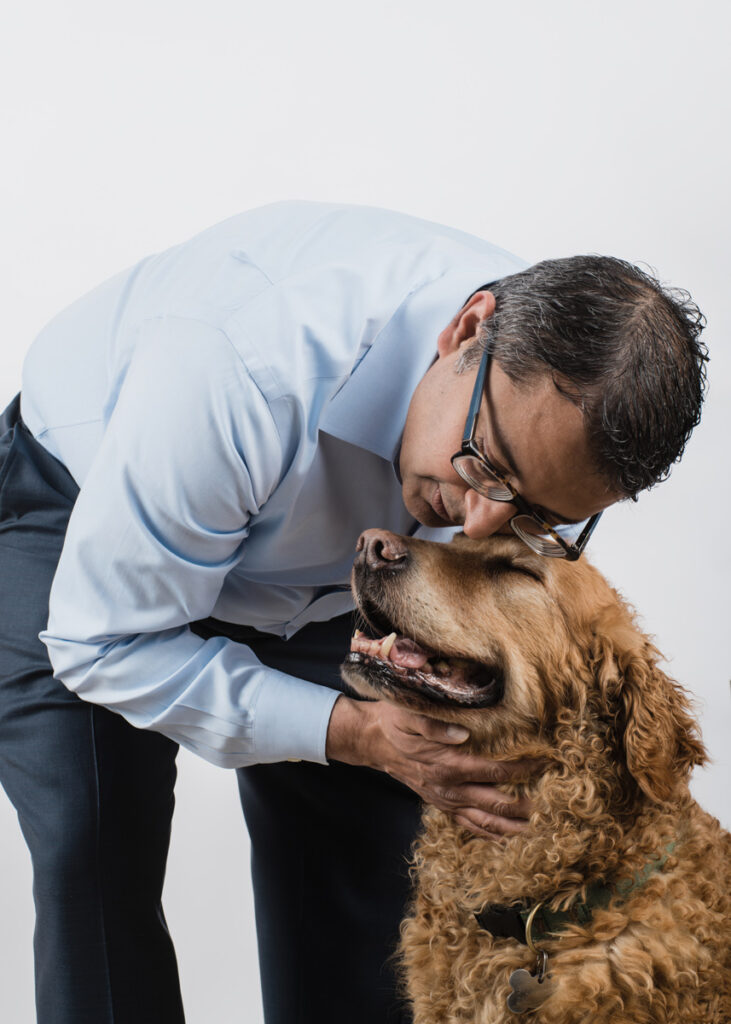
Shah and I discussed that possibility at length on a recent afternoon at Rockport’s Samoset Resort, where a national pediatrics organization was presenting him its Child Health Advocate of the Year award. We met before the ceremony and took a walk together on the neighboring Rockland Breakwater. Like most people one primarily sees on a screen, he seemed a little shorter in person. If anyone recognized him on the breakwater, they didn’t let on (he was without his characteristic glasses). As we walked, he compared himself to a soap opera star. “I play a character, but the character happens to be me,” he said. “People know me from, like, one-hour snippets.”
Later, during a two-hour interview in a spare resort conference room, he told me that every time he hears, “Are you Dr. Shah?” he braces himself. It’s partly because he’s aware of the vitriol health officials in other states have received, partly because of the tenor of some of the comments aimed at him on Twitter and via email. Only twice has anyone said anything less than positive to his face — once outside the CDC’s Augusta offices and once at a vaccine clinic, where anti-vax protestors stood outside. The norm, he says, is still interactions like one he had recently at Waterville’s Colby College, where a professor approached him and wept, telling him how much it meant when she wrote to the Maine CDC early in the pandemic and received a response. Or like the one he had in Calais in May, when a woman in a truck with a Trump sticker pulled alongside him as he loaded up his Tesla, then told him that while she didn’t like that Dr. Fauci, she appreciated everything Dr. Shah had done.
He calls all of it extremely gratifying — the albums, the cards, the tears, the 40,000-strong Facebook fan club — but he’s also aware, perhaps more than anyone, of how quickly things can turn. He seems ready for it. “People love you right before they hate you,” he says. “And the speed of that descent is very fast.” In March, after tapering back their frequency, he stopped giving his briefings altogether, both because the pandemic no longer merits being called an emergency, he says, and because he recognized that each one was an opportunity to screw up. “You’re always this close to the line of completely saying something that gets you fired,” he says. “One minute you’re talking about COVID, the next minute you’re talking about condoms for kindergartners — like, that’s it.”
Shah says he has a thick skin. He also has perspective. He knows from experience that every outbreak — Legionnaires’, COVID, HIV — is political. In Illinois, he was the target of the Democrats. These days, on Twitter anyway, he’s the target of Republicans. As he sees it, it’s just part of the job. When I asked him how he categorizes himself — as a doctor? epidemiologist? economist? lawyer? politician? — he told me that he’s a bureaucrat.
But Shah is not without ego or pride, as he says himself. For much of his life, he told me, he assumed he was the smartest person in every room — he was, he says now, “insufferable.” He has a jealous streak too, although its targets seem exclusively to be polymaths and child prodigies: He name-checks the head of the CDC for New York State, who graduated from college in his teens and on whom ’90s TV writers based Doogie Howser, M.D. Also, Nathan Myhrvold, a former Microsoft exec who penned the five-volume culinary tome Modernist Cuisine, about the science of cooking. Working at the Chicago law firm helped him check himself, Shah says, because he was surrounded by so many geniuses. Although it’s hard not to think that having two sitting senators calling for one’s head — and then, within a year, losing a parent — might cause a degree of ego death.
A flash of the old ego shows, though, when Shah runs down the state’s COVID-response numbers. Apart from the PPE inventory, he is proudest of Mainers’ high vaccination rates and how quickly they attained them. He credits large-scale vaccine clinics, like the one set up at the horse-racing venue Scarborough Downs, where staff administered some 3,000 shots a day (Shah made the rounds visiting clinics in person, often trailed by Quincy the rescue dog). He also cites the state’s dead-simple, exclusively age-based vaccine-eligibility standard. He got hate mail for both of those programs — he was accused of being ableist for the latter, because it didn’t take into account pre-existing conditions — but because of them, he insists, Maine vaccinated more people more quickly and at a steadier pace than any other state. “The numbers speak for themselves,” he declared, laying out his palms on a Samoset conference table. He can rattle off weeks of rankings from the early days of the race to get shots in arms: for months, Maine was the only state consistently in the top 10 for vax rates. We never fell off the list. If he were an academic, Shah says, he’d do a study on just how many lives were saved.
This fall, once again, the governor who appointed him will be up for re-election. Shah insists that, no matter which way the election goes, he plans to stay in Maine. “We just signed up to put a heat pump on our house,” he says. “We’re staying.” He even suggested, admittedly in passing, that he might just run for office himself someday — if only as a way to stick it to the racists who sometimes come after him on Twitter. “It just emboldens me,” he says. “I’m like, you know what, motherf*ckers? I’m staying. You think you’re going to bully me out of the state? Not even close. I might even run for office, just to stick it in your face.”
Coffin, Shah’s friend and neighbor, made a similar suggestion. “I think the pandemic exposed fissure points in our society and the way that government functions,” he says. “People don’t really trust the buttoned-up, streamlined politician anymore. Someone like Nirav, he is who he is. The way he rolls is definitely asking us to imagine what else a politician might be or expand our definitions of what a politician might be. I think it wouldn’t be a bad thing to have someone like him in perpetuity, someone who has their finger always on the pulse, in terms of what our public-health needs are.”
Though he’s ended his briefings, Shah has by no means disappeared. The spring commencement-speech circuit brought him to the University of Southern Maine, Bates College, and Washington County Community College. After receiving the award at the Samoset, he patiently took photographs with everyone who asked. Two days later, he was back on public radio, where he remains a recurring call-in guest.
The following Sunday was Mother’s Day, and Shah spent most of the day at home, making waffles for his neighbors. He’d set up a little table outside, Coffin told me, with whipped cream, orange juice, and three different kinds of maple syrup. “He’s always trying to perfect things, and he was like, ‘I’ve perfected my waffles,’” Coffin says. “We were all out there from like nine in the morning til one in the afternoon, having a beautiful day, eating waffles. We’d see Nirav every eight minutes, the exact amount of time it takes to make a waffle.”




